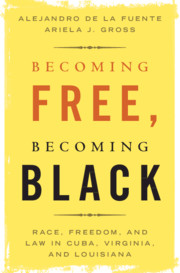Book contents
- Becoming Free, Becoming Black
- Studies In Legal History
- Becoming Free, Becoming Black
- Copyright page
- Contents
- Figures and Tables
- Preface
- Abbreviations
- Introduction
- Chapter 1 “A Negro and by Consequence an Alien”
- Chapter 2 The “Inconvenience” of Black Freedom
- Chapter 3 “The Natural Right of All Mankind”
- Chapter 4 “Rules … for Their Expulsion”
- Chapter 5 “Not of the Same Blood”
- Conclusion
- Notes
- Index
Introduction
Published online by Cambridge University Press: 16 January 2020
- Becoming Free, Becoming Black
- Studies In Legal History
- Becoming Free, Becoming Black
- Copyright page
- Contents
- Figures and Tables
- Preface
- Abbreviations
- Introduction
- Chapter 1 “A Negro and by Consequence an Alien”
- Chapter 2 The “Inconvenience” of Black Freedom
- Chapter 3 “The Natural Right of All Mankind”
- Chapter 4 “Rules … for Their Expulsion”
- Chapter 5 “Not of the Same Blood”
- Conclusion
- Notes
- Index
Summary
The Introduction discusses some of the main questions that the book seeks to answer and relates the book to previous scholarship on race, slavery, and the law in the Americas. We approach the early comparativists’ broad questions about the development of regimes of race and slavery with the tools and approaches of cultural-legal history close to the ground. Rather than start with static legal traditions to trace their effects in law, we look at the way legal practices, emerging not only from doctrines and traditions but also from participants’ strategies, including slaves’ actions, shaped institutional change. It also explains the choice of three plantation societies for the study: Cuba, Virginia, and Louisiana. Historians have often paired Cuba and Virginia as exemplars of the Spanish and British systems; this book adds a third point of comparison, the hybrid legal system of Louisiana, where it is possible to examine how slaves took advantage of shifting legal regimes during the eighteenth and nineteenth centuries to obtain freedom.
- Type
- Chapter
- Information
- Becoming Free, Becoming BlackRace, Freedom, and Law in Cuba, Virginia, and Louisiana, pp. 1 - 12Publisher: Cambridge University PressPrint publication year: 2020



